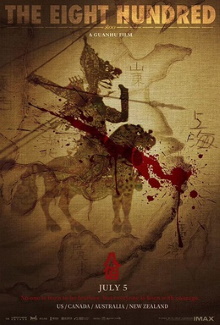Everyone should know this as the landmark Chinese propaganda film from last year and amazingly it was also the highest grossing film worldwide of the year due to US cinemas being mostly shut down during the pandemic. This made it a much watch for me, patriotic bombast notwithstanding. Overall I found it to be an effective action film with fantastic production values. It is however highly exaggerated and from what I can tell somewhat ahistorical, though probably not out of malice.
Overwhelming losses against the Japanese force the National Revolutionary Army of China to cede ground in Shanghai. The Sihang Warehouse becomes a gathering point for the various scattered units including deserters and has already been held by a regiment under Xie Jinyuan for three months. Across the Suzhou Creek from the warehouse is the foreign concession zone which the Japanese cannot attack for fear of drawing the Western countries into the war. This means that the battles between the Chinese and Japanese forces for control of the warehouse are in full view of the foreigners and the Chinese living there and the Japanese are unable to employ heavy weapons such as artillery. For symbolic reasons, Xie is ordered to hold the warehouse for a further three days to demonstrate to the Western powers that China is still determined to resist the Japanese invasion. Similarly the Japanese ramp up the intensity of their attacks in order to deny even this symbolic victory to the outnumbered Chinese.
This incident is for obvious reasons a very popular subject for adaptations into different forms of Chinese media and I presume this is why it doesn’t try too hard to go into the historical background and why it changes up some of the details. One somewhat surprising artistic choice is that the film highlights the trials of an irregular squad composed of remnants and deserters from other units who made it to the warehouse. They want out of the fight either because they are terrified or they aren’t soldiers at all but brutalized and threatened by the others and even executed when they try to run away or refuse to fight. Since most of them do end up finding their courage and contribute to the defense, I suppose it makes for a good object lesson that the Japanese had conquered so much ground only because most Chinese didn’t have the guts to resist. Yet at the same time, they make for so much more interesting characters than the cardboard cutout perfect heroes that are Xie and his regular soldiers. Those effectively have no individual personality at all as all they ever say are exhortations to be patriotic and to fight courageously. The presence of these loser soldiers aren’t enough to save this film from being emotionally dull but they certainly help a lot.
Technically this film looks amazing of course and feels properly cinematic in scale. Every scene is so full of movement and so rich in visual detail. The violence here is particularly effective in that it’s not sanitized. Being willing to show fingers being blown off and faces chewed up by shrapnel goes on a long way to show the consequences of real warfare. But to me the real prize are the sumptuous shots of the concession across the river and the depiction of the kind of luxurious life lead by the elite during that era. They have Chinese opera on the street juxtaposed with fancy casinos and sharp Western fashions. Then the camera pans around to look behind the warehouse and it’s all bombed out ruins and desolation. This is so much more effective an indictment of the insouciance of the upper classes while China is fighting against an invading force than any amount of patriotic speechifying.
Overall I judge that this film comes close to being good but they still need to learn the value of restraint. They go overboard not just in the bombast but in the horrific losses taken by the Chinese soldiers as well. The film is too eager to show them dying in droves, being heroes who sacrificed their lives and so on, but there is so much of it that it becomes almost farcical and reduces the impact of each death. For example, the film shows a line of Chinese soldiers jumping off the building strapped with explosives to suicide bomb the Japanese. In real life, there seems to have been a single such bomber and I think it would have been more dramatic just to show that one single person. It’s so strange to me that the Chinese military are stereotyped in fiction to field hoards of lemming-like sacrificial lambs and instead of playing against the stereotype this film chooses to go along with it. The narrative here should be about a small group of soldiers, a little over 400 in reality, making a difference so it feels that to have them spend their lives so cheaply like this. It’s wonderful that China has caught up to Hollywood in making big budget spectacles like this but they need to remember that sometimes less is more.
